- Home
- Rudy Rucker
Mathematicians in Love Page 8
Mathematicians in Love Read online
Page 8
The solution involved, among other things, sheaves, teapots, and Mobius strips—arranged just so.
All this time I was still playing my guitar, my hands and ears off in a world of their own, and the music getting ever lovelier. On the fly, I was translating my thoughts into smeared and tangled hypersheets of sound.
Grinning and sweating, I labored to imprint the cockroaches’ subtle codec solution upon my memory. It was, um, Klein bottles, Minkowski space, cellular automata, and—
"Dude1. Where’s my sister?”
The mirror-roaches chirped, rotated at some impossible angle and disappeared. I was back to so-called reality, seeing a tall, skinny guy with shades peering in my bedroom door. His face was gaunt, he had long dark hair slicked straight back, he wore a rumpled blue jumpsuit.
“Bag the noise!” he yelled. “I’m lookin’ for Alma.” It was Pete Ziff. We recognized each other from the surf scene back at Cruz.
I stopped playing—and snapped out of my trance. What had I been doing just now? Had that been real? My solution to the codec problem, if it really was a solution, was shifting like a sand-castle lapped by a rising tide. For the moment I didn’t care. I was glad to be alive, glad to be normal again.
“It’s good you came,” I told Pete. “I was seeing, like, mathematician cockroach aliens in my mirror. Teaching me things.”
“Stoned geek,” said Pete. “Where the fuck’s Alma and her shit?”
“She left,” I said. “With Paul Bridge. My roommate.” I wanted to tell Pete as much as possible about Paul’s whereabouts. That lucky pig was getting off way too easy. “They’re moving into the faculty housing at Stanford.”
“Where's that at?”
“Duh? Palo Alto? I’d be glad to write down his cell phone and address for you.” I tore a scrap off the folded-in-four sheet of paper from my hip pocket and uncapped my pen. I didn’t like the way Pete was looking at me. I’d never liked Pete. “You can read, can’t you?”
“Fuckhead hairfarmer. Alma’s really gone?”
“Here.” I jotted down the info and handed it to him. “FYI, Alma said she’d rather die than live with her family,” I added.
Pete spat on the floor and stalked out. As long as I had my pen and paper handy, I made a drawing of what I remembered about the generalized solution to the codec problem. A little comic strip of four panels. There had been a fifth frame, but that was one of the parts I already couldn’t remember.
As I sketched, I heard Pete and Gary Ziff yelling at each other in the street, with Sarah remonstrating in the background. And then I heard the pop and roar of Pete’s motorcycle, the one with the funky bracket for his surfboard welded to one side. Although it wasn’t even suppertime, I could also hear the sounds of several post-commencement parties cranking. Humelocke was full of music.
Without looking in the mirror again, I shoved the paper in my pocket and got the hell out of my room. I wanted to be around people. Enough with the math.
It had clouded over again, and was spitting bits of rain. I decided to walk a few blocks and visit my friend Danny Nguyen, a fellow math grad student. He had a couple more years of study ahead of him, and I knew he was sticking around for the summer. Although his field was differential geometry, studying the possible shapes of higher-dimensional surfaces, he was also interested in what everyone else was doing—he’d even come to my thesis defense. Danny was intelligent, preppy, and polite; I could see him as a department chair some day.
To cut down on his living expenses, Danny had signed on as a proctor in Bulkington, which was probably the wildest of the student co-ops. The Bulkington graduation party was well underway when I got there.
The neighbor next door to Bulkington had a problem. He was a fat-necked guy with longish black hair, standing next to his unbelievably large SUV, hollering at three grungy little skate-dreggers: a couple of Asian-Indian boys and an Anglo girl—all of them pierced, short-haired, feral. Apparently the skaters had been grinding the man’s front steps as well as those of the Bulkington co-op. One of the boys was wearing a construction-orange vest that he’d wired as a beat box. As the man yelled, the boy’s hands played over his vest, making a mocking sound-track of off-kilter rhythms.
Danny Nguyen appeared at the dorm entrance, alert to the crisis, his eyes intent behind his heavy black-framed glasses. He wore a lot of mousse in his short hair, sculpting it into hedgehog-like pattern of peaks.
“Hey Danny!” I called.
“Hi, Bela. You can help me out.” He turned to the skaters. “I know that you guys don’t live here, so don’t be giving us a bad name. The party’s an open house; come on in and have a good time. But don’t bother our neighbor Mr. Vitelloni. Or maybe Bela here kicks your butt. Just kidding. It’s party time. No fights, no cops, free beer inside. But remember—Doctor Bela is gonna be watching you.”
“Nice beat,” I said to the skater with the vest, a dark-skinned guy with a beaky nose and a prominent Adam’s apple. "I like how off-balance it is. I’d maybe push it a little further, a little closer to random noise.”
“Monster music,” said the kid, tapping his vest in several places. The sounds thickened and folded, with unexpected wrinkles. “Feedback modulation,” he said. “Electronic tabla. You’re Doctor Bela? My name’s Naz.”
“Make it very strange now, Naz,” said the other boy skater, holding out his well-muscled, golden-skinned arms and writhing them like snakes. “I’m Thuggee and this is K-Jen.” His voice had that subcontinental singsong lilt.
K-Jen was a stocky blonde girl with a strong chin and high cheekbones. Her lips were irregular at the edges, giving her mouth a smeared look. Her eyes had something twitchy and anxious about them. She also had pimples, a nose ring, and a shag that had mutated into matted tufts.
“He said free beer?” said K-Jen in a husky voice. “Eek.” She gave Mr. Vitelloni the finger, and led the other skaters into Bulkington.
“Little snots,” yelled Vitelloni, thrusting out his jaw and waving a fist. His wife watched from the porch, stick-thin and sour.
“Excuse me? Excuse me?” she called to get Danny’s attention. “Mr. Nguyen? I’m expecting your crew to repaint our steps come clean-up day.”
“No problem, Ms. Vitelloni,” said Danny. “Just remind me if I forget.”
College kids were milling around the halls of Bulkington, smoking pot and hitting the kegs in the communal dining area on the first floor. I saw a naked curly-haired guy carrying a dark green plastic trash bag, seemingly with nothing in it. He’d drawn a giant raven beak on his chest, with his nipples painted black for eyes.
“Caw caw,” he yelled in a deep voice. “Wak wak. Wak caw bong ork whooo!”
“We call him the Birdman,” Danny told me. “He keeps that garbage bag full of nitrous oxide. He got a tank from an auto shop.” Danny shook his head. “I might not proctor here next year.”
We made our way into the common room and joined the knot of people around the silver kegs. A couple of other math grad students were there, too, Dirk Wronski and Eugenia Fraze. It was interesting to join Danny for the Bulkington parties.
“Congratulations on your degree, Bela,” said Dirk, toasting me. He was tall and raw boned, wearing a shiny gray suit over a starched white shirt as if to emulate the 1950s immigrant mathematician look. Very dregger. “Any job nibbles yet?”
“The chairman said next week he’ll try and help me,” I said, glad to be talking. “Paul’s already off for Stanford. And, listen to this, he took Alma with him.”
“No!” said Eugenia, whose round, steel-framed glasses were a stern contrast to her sweet, pixyish face. “Poor Bela.”
“I want to hear about this too,” came a voice from behind me. It was Leni Pex, intimidatingly fit, and all dolled up in pancake makeup, trailing two equally theatrical women in her wake. Leni was wearing a ring with a lens on it. One of those vlog rings she’d been talking about. The ring itself looked to be made of plastic, reddish with shades of blue.<
br />
“You’re webcasting live?” I said, not all that glad to see her. Encountering Leni gave me a pang for Alma; it hit me like a knife in my heart—to use a favorite Hungarian expression. We get the most out of our emotions.
“I always vlog live at parties these days,” said Leni. “It’s, like, my Web show. Out with Leni. Glad to see you’ve got a beer.” She let out an insinuating chuckle. “Graduation party, hmm? I hope you get drunk and spill your guts for my viewers. Do you know my friends? Dorothy Hook and Lulu Cliff, this is Bela Kis, who just got a Ph.D. in math, am I right?”
“Yeah, I made it,” I said. “No thanks to Buzz for airing that demo. The thesis kept getting harder at the end. Like climbing an
Alp. You might say I’ve got altitude sickness now. These are my fellow mathematicians Danny Nguyen, Dirk Wronski, and Eugenia Fraze. Look out, guys, Leni is webcasting us live. Dozens, perhaps scores of no-life losers are watching us as we speak.”
“You’d be surprised at our hit counts,” said Leni equably. “We’ve started selling ads. Dorothy and Lulu are my partners. We all graduated today. Dorothy in communication, me in business, and Lulu in computer science. We’ve got big plans. We want to take Buzz public in two years.”
“I remember you,” I told Dorothy. She had vivid red lipstick and bobbed black hair. Kind of a 1920s look. “You were in a calculus section I taught a couple of years ago. But you dropped almost right away.”
“I found a way to substitute an online philosophy course for it,” said Dorothy. “Self-paced.”
“You didn’t like my teaching?”
“Didn’t like anything about you,” said Dorothy, laughing. “Shoes, voice, smell, and those questionable stains around your zipper—ugh1. Just kidding. You were fine. It was the stuff you wrote on the board. I was all, do I need to know this to communicate? Noooo. I can’t imagine how anyone could take math course after math course to get a Ph.D. It must be like memorizing the Star Wars movies. All those hunchbacked little deltas and epsilons and their stupid battles. I don’t have math anxiety, Bela, I have math contempt.” Stagily she clapped her hand over her mouth. “And to think I said that live on the Out with Leni show!” “Wasn’t Alma living with you?” Lulu asked me. She looked like a depraved schoolgirl, with thick makeup, black bangs, a frilly white blouse, a blue miniskirt and horizontally striped black and red stockings. “I remember she moved out of Leni’s when I helped put the extra servers in. She was steamed about losing her room.”
“Steamed latte,” purred Dorothy. “I love Alma’s skin.”
“Not that you ever got your hooks into her,” put in Lulu, kissing Dorothy’s cheek and leaving a lipstick mark. Lulu winked for the camera and Dorothy stuck her tongue in Lulu’s ear. They were really camping it up.
“Did I hear you say that Alma Ziff left with your roommate Paul Bridge?” said Leni, holding up her vlog ring to catch my reaction.
I didn’t answer that one. I noticed the three skaters from outside were getting themselves each another pitcher of beer. Naz’s beat-vest was booming even funkier sounds than before; synthetic sitars on top of the tabla beat, everything hooked into feedback loops, slowing down and speeding up unexpectedly. I hadn’t realized a digital system could sound that wonderfully weird. We hadn’t used any electrónica in E To The I Pi.
“That kid Naz has a knack for steering his sound algorithms between, harrumph, the Scylla and Charybdis of noise and repetition,” I said to Leni by way of a distraction. “Threading between the random reefs and the sullen maelstrom.” The beer was going to my head. “I need to sit down.”
“Let’s all go hang in my suite,” said Danny. He was eyeing Lulu with the hopeful expression of a dog waiting for a scrap to fall off the table. “It’s right behind the community room.”
So we retreated into Danny’s apartment, really quite sizable considering he didn’t pay any rent at all. It was furnished with a decade’s worth of Bulkington leftovers, things that students hadn’t bothered to take along when they moved on. Just for the hell of it, Danny had bedecked his walls with scavenged psychedelic posters illuminated by black lights—the kinds of things that freshman and sophomore students would acquire and then outgrow. Some of the posters showed figures of real mathematical interest: Escher’s Móbius strip with ants walking on it, zooms of the Mandelbrot set, a snowstorm of stellated polyhedra, tumbling hypercubes, like that.
“Cooool,” said Lulu; taking it in. “The lair of the mathemagi- cians.”
She was mocking us. But enjoying us too. She was, after all, a computer scientist. Maybe Danny had a chance with her. I flopped into a velvet-cushioned Danish Modern chair.
“You still didn’t tell me about Alma and Paul,” persisted Leni, pulling over a wing-backed armchair and dangling her hand like a queen offering her ring for a kiss. “Feed the Buzz. Tell all.” Dorothy and Lulu leaned on the chair behind her: smirking, sinister courtiers.
“Bela’s the man,” said Danny, pleased to see a fellow- mathematician’s moment of fame.
“Don’t say anything you don’t want to,” cautioned Eugenia.
But with Leni and her partners laughing and commenting and egging me on, I went ahead and told the world not only about Alma leaving with Paul, but about Haut’s breakdown, my fruitless job search, and the weirdness of the Ziffs.
While I was talking, Eugenia checked Danny’s computer to see if I was really there on the Buzz channel, and indeed I was, but with my voice delayed just enough so that hearing it tripped me up. Eugenia turned the sound back off, but left the picture on. I wondered if Alma was watching me.
Meanwhile Dirk kept bustling out to the common room like some demonic Wroclaw drink-hall denizen, elbows out, forehead glistening, bringing back four pitchers of beer at a time. Normally I’m not much of a drinker, and soon my jaw was so well-oiled that I sang a few of the riffs I’d been playing that afternoon, spilled my whole vision of the cockroach people, and began explaining my new ideas about solving the codec problem. I even got out my little scrap of paper with the four drawings and speculated about the forgotten fifth frame.
A few other people from the party drifted in to watch me showing off—Sue Boo, Kenny Yoder, Amparo Alvarez. Friends
of Leni’s, business majors into gung-ho hearty games of volleyball. But even they were digging my rant. Something about my worldview struck the nonmathematicians as comical—even the parts that I thought were serious.
When I was about done, Leni got a call on her handheld, a chunky little cell phone with a miniature keyboard and a separate earpiece. “I’ll ask him now,” she said into its mike.
“You said you need a job, Bela,” said Leni, turning her piercing blue eyes to me. “Well, guess what, my main backer wants to make you an offer. You can be the first twenty-four/seven full-time vlogger for Buzz."
Although I was sober enough to realize that the gig would be something like working as a sideshow freak, I was drunk enough to consider doing it. “How much would you pay me?” I asked.
“Hold on,” said Leni, listening to her earpiece. And then she named a figure that surprised me. The other kids at the party cheered. “That’s for a week,” added Leni. “And you also get a percentage of our ad revenues. The more people you draw in, the more you make. We might have you back for more weeks if there’s an audience.”
“You’ll really give me that much money?” I asked.
“Hell yeah,” put in Lulu. “Buzz is for real. We’re paying over a thousand bucks a month for the bandwidth to download all those megs of video to our clients.”
“I’ll take the job,” I said, impressed.
“Here’s the contract,” said Leni, passing me her handheld. Dense text appeared on the little screen. “To accept the terms, say ‘Yes,’ and press Enter.”
“What’s in the contract?” asked Eugenia, peering over my shoulder. “Be careful, Bela.”
“Limited time offer!” said Leni in a teasing yet peremptory tone.
&nb
sp; I scrolled through the tiny lines of legalese. Essentially I’d be signing away my right to privacy for a week, with the contract mutually renegotiable at the end of the week. I’d be wearing a vlog ring and apparently I wouldn’t be allowed to remove it till the end of the contracted week—unless I wanted to forfeit my pay and pay a hefty penalty charge.
“All right,” I said, giddily pressing Enter. “Yes.”
Leni slipped a dark blue vlog ring on to my left hand’s ring finger like she was knighting me. It was a perfect fit. The ring wriggled, tightening itself.
“You can tell how you’re doing by the color of your ring band,” said Leni. “The more people viewing your current Webcast, the redder the ring gets. If you keep it red a lot, that means more income for Buzz—and a better chance of us asking you back to do another week.”
“Play the guitar for us!” suggested Dorothy. “Like what you played when you saw the giant cockroaches in the mirror this afternoon!”
“All right,” I said. There was in fact a band playing in the Bulkington common room now, and I knew the bassist, a skinny guy called Rico. We’d jammed together a few times. The band had an extra guitar, and they let me join in for a golden oldie, Samadhi’s “Flop Sweat,” my choice, as I’d often practiced their now-dead lead player’s wonderfully sinuous guitar line, a buzzing wail like the trail of a homemade dregger airplane looping and rolling and going down in joyous fuck-you flames.
I was playing great, in my humble opinion, and my ring band was nice and red, but after that one number, the regular guitarist asked me to step down. Maybe he was jealous. Or maybe I didn’t sound as good as I imagined. I was pretty drunk.
I needed air and decided to head for the roof. On the way up the back stairs, I overtook Naz, Thuggee, and K-Jen. They were lugging a washing machine from the basement. K-Jen seemed less haunted than before; the beer had mellowed her out. She was singing something slow and rhythmic to help them push, her voice older and more worldly than I would have expected.

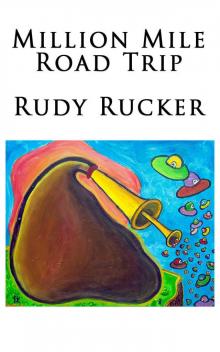 Million Mile Road Trip
Million Mile Road Trip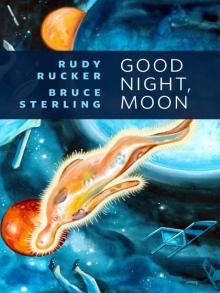 Good Night, Moon
Good Night, Moon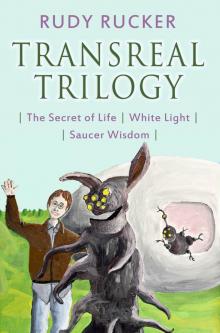 Transreal Trilogy: Secret of Life, White Light, Saucer Wisdom
Transreal Trilogy: Secret of Life, White Light, Saucer Wisdom Complete Stories
Complete Stories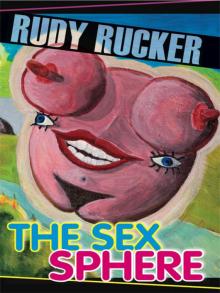 The Sex Sphere
The Sex Sphere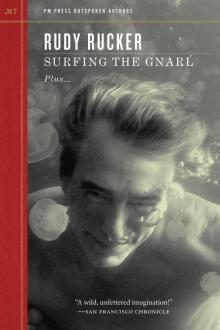 Surfing the Gnarl
Surfing the Gnarl Software
Software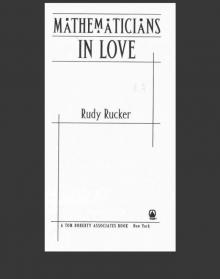 Mathematicians in Love
Mathematicians in Love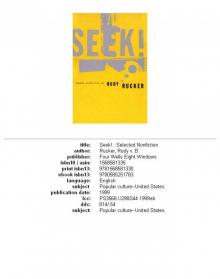 Seek!: Selected Nonfiction
Seek!: Selected Nonfiction The Secret of Life
The Secret of Life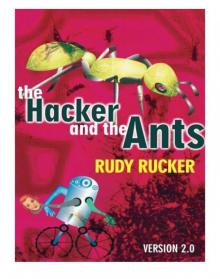 The Hacker and the Ants
The Hacker and the Ants Postsingular
Postsingular Spaceland
Spaceland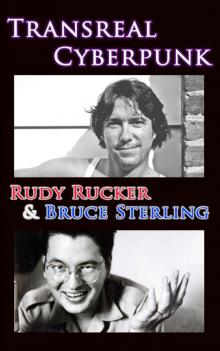 Transreal Cyberpunk
Transreal Cyberpunk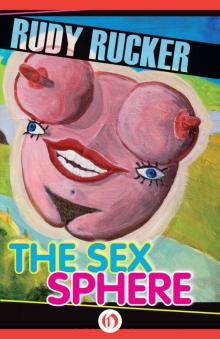 Sex Sphere
Sex Sphere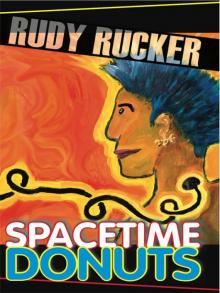 Spacetime Donuts
Spacetime Donuts Freeware
Freeware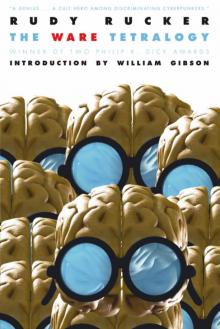 The Ware Tetralogy
The Ware Tetralogy Frek and the Elixir
Frek and the Elixir Junk DNA
Junk DNA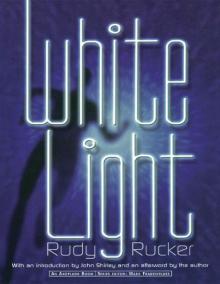 White Light (Axoplasm Books)
White Light (Axoplasm Books) Nested Scrolls
Nested Scrolls Inside Out
Inside Out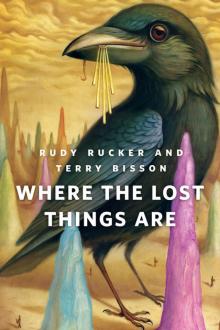 Where the Lost Things Are
Where the Lost Things Are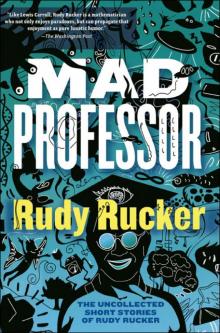 Mad Professor
Mad Professor As Above, So Below
As Above, So Below Realware
Realware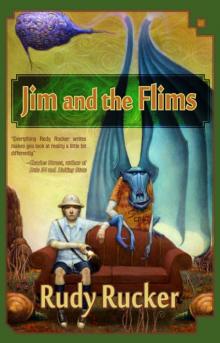 Jim and the Flims
Jim and the Flims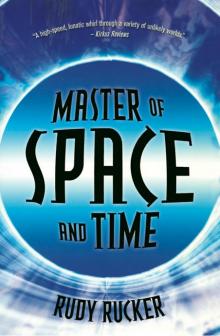 Master of Space and Time
Master of Space and Time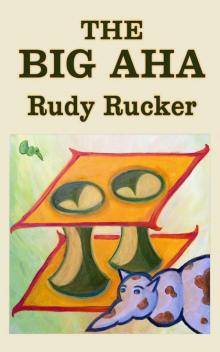 The Big Aha
The Big Aha Hylozoic
Hylozoic